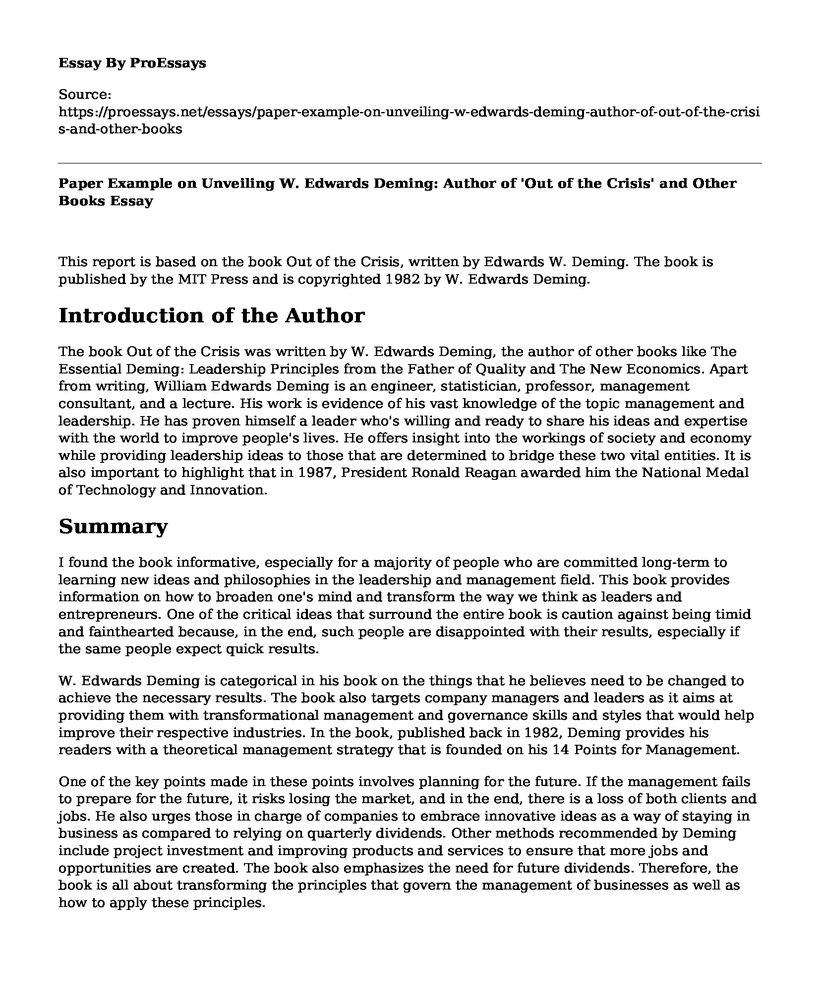This report is based on the book Out of the Crisis, written by Edwards W. Deming. The book is published by the MIT Press and is copyrighted 1982 by W. Edwards Deming.
Introduction of the Author
The book Out of the Crisis was written by W. Edwards Deming, the author of other books like The Essential Deming: Leadership Principles from the Father of Quality and The New Economics. Apart from writing, William Edwards Deming is an engineer, statistician, professor, management consultant, and a lecture. His work is evidence of his vast knowledge of the topic management and leadership. He has proven himself a leader who's willing and ready to share his ideas and expertise with the world to improve people's lives. He offers insight into the workings of society and economy while providing leadership ideas to those that are determined to bridge these two vital entities. It is also important to highlight that in 1987, President Ronald Reagan awarded him the National Medal of Technology and Innovation.
Summary
I found the book informative, especially for a majority of people who are committed long-term to learning new ideas and philosophies in the leadership and management field. This book provides information on how to broaden one's mind and transform the way we think as leaders and entrepreneurs. One of the critical ideas that surround the entire book is caution against being timid and fainthearted because, in the end, such people are disappointed with their results, especially if the same people expect quick results.
W. Edwards Deming is categorical in his book on the things that he believes need to be changed to achieve the necessary results. The book also targets company managers and leaders as it aims at providing them with transformational management and governance skills and styles that would help improve their respective industries. In the book, published back in 1982, Deming provides his readers with a theoretical management strategy that is founded on his 14 Points for Management.
One of the key points made in these points involves planning for the future. If the management fails to prepare for the future, it risks losing the market, and in the end, there is a loss of both clients and jobs. He also urges those in charge of companies to embrace innovative ideas as a way of staying in business as compared to relying on quarterly dividends. Other methods recommended by Deming include project investment and improving products and services to ensure that more jobs and opportunities are created. The book also emphasizes the need for future dividends. Therefore, the book is all about transforming the principles that govern the management of businesses as well as how to apply these principles.
Body of the Review
This book is both theoretical and factual. Apart from providing real-life applications into leadership and management, the book applies to any company or firm. It is unique in the fact that it allows for tools that help transform the existing management styles in our styles. His ideas are borrowed from statistical principles in Japan that helped turn the country's economy around after World War Two. These principles help in the production of cheaper products and of higher quality. During this period, Japan appeared to be making massive strides in the global economy, which caused trouble for the U.S. industry. For these reasons, Deming provides the foundation for improving management as a way of dealing with the economic crisis.
Deming (1982) believes that to address the crisis, and there is a need for effective management and an effective way to measure this performance. The book also contains insights on what managers do wrong. After the background information, Deming provides his famous 14 Point for Management which is aimed at transforming the American industry. These points outline the obstacles and diseases that hinder transformation, their causes, and ways to improve on quality.
The 14 Points provide a theoretical and applicable approach towards dealing with the declining nature of the Western and American industries. According to Deming, the primary way through which companies and industries can address this problem is by reconstructing their management styles. He also highlights some of the issues that affect many Western industries including lack of a constancy of purpose that is in line with the intent to plan product and services that will keep these industries in the market and providing jobs.
Conclusion
The book is aimed at improving industries and helping them overcome inefficient and poorly ran management systems by assisting them in establishing the problems and errors that face a majority of these industries. Deming 14 Points provide managers with new ways for them to approach their roles and improve how they run their companies. The points also provide them with new ways of approaching financial and managerial problems as a way of improving competition on a global scale.
Reference
Deming, W. E. (1982). 1994. Out of the Crisis. The MIT Press
Cite this page
Paper Example on Unveiling W. Edwards Deming: Author of 'Out of the Crisis' and Other Books. (2023, Feb 09). Retrieved from https://proessays.net/essays/paper-example-on-unveiling-w-edwards-deming-author-of-out-of-the-crisis-and-other-books
If you are the original author of this essay and no longer wish to have it published on the ProEssays website, please click below to request its removal:
- Onset of Great Expectations
- The Five Competitive Forces that Shape Strategy
- Hamlet's Hamartia Essay
- Paper Example on Christian Virtue and Civic Responsibility
- Operations Management Job Essay
- Power and the Image of Nursing Essay Example
- Essay Sample on Paul Castro: A Prideful Second-Generation Immigrant Seeking Fairness







